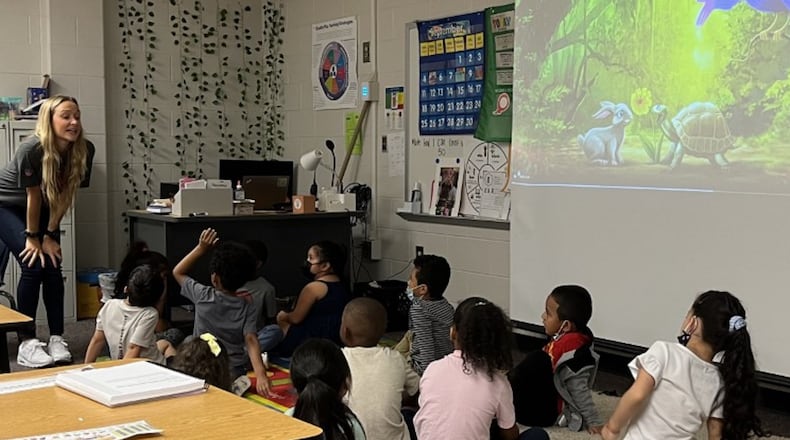“Regarding its academic standing for states, Georgia is roughly average. This is up slightly from where it was several decades ago. However, by focusing on a child’s emotional as well as academic needs, Georgia can be in the top tiers of our nation’s schools.” — Pam McNall, CEO and founder of Respectful Ways
Several studies have come out which have analyzed our national K-12 educational situation. In these days of tribalistic politics, this is, and should always be, a nonpartisan issue.
Over time, Georgia’s academic ratings are slightly improving versus other states and our own historical record. On the positive side, our state has made substantial gains regarding math proficiency. In 1992, only 53% of fourth grade students were at or above proficiency. But by 2024, that number had dramatically risen to 75%. Only 1% had advanced proficiency in 1992, but that number rose significantly to 9% by 2024.
Reading scores also improved, but much less so. Only 57% of fourth graders were at or above proficiency in 1992, while 59% were in 2024. However, the percentage who were at an advanced level increased from only 5% to 9% in 2024.
When analyzing these figures, it should be noted that, as a direct result of the COVID-19 pandemic, national reading and math scores fell between 2019 and 2022. In 2023 and 2024, they rebounded. Regarding reading, Georgia fell 4%, less than 38 other states. Only two states had improved reading scores — Alabama at 2% and Louisiana at 6% — between 2019 and 2024.
It is wrong to take the easy way and just blame our educators. Many of my relatives are underpaid schoolteachers, some in low performing schools. These highly motivated educators work long hours, making less than they could make in the private sector. They are in this occupation because they’re dedicated to improving the lives of children they teach. They are motivated to help students succeed academically, building a better life.
Credit: Contributed
Credit: Contributed
The bad news is that this is a long-term situation which cannot be turned around overnight. In this age of cellphones and the internet, our school kids are having difficult behavioral problems which lead to poor academic achievement.
The good news is that there are proven methods for turning the situation around and improving Georgia’s schools. In this electronic age, students have difficulty knowing what is real and what is imaginary. They hear and see so much that they are in sensory overload. As one step among many, we must focus on improving social and emotional aspects, making our children feel better about themselves and their academic environment.
Georgia’s schools must teach girls and boys to empathize with others: the key to humanity. This can happen via implementing targeted Social and Emotional Learning programs in each of Georgia’s schools. Per the Learning Policy Institute, scientifically based SEL programs “taught by classroom teachers, promote the development of social and emotional competencies. Fostering these competencies facilitates positive, pro-social behaviors and positive relationships with others. SEL programs reduce disruptive behavior problems and emotional distress.”
If a fellow student is having problems, the student is taught to proactively help him or her. Rather than laughing derisively, pointing fingers and recording the debasing incident on your cellphone to immediately post to TikTok. Our children must understand right from wrong and want to do what is right, for themselves and others.
Experts recommend four strategies for students:
- Embrace monotasking.
- Design your environment — eliminating distractions wherever possible.
- Clarify tasks — breaking them into specific steps.
- Recover quickly — accepting slips, resetting and moving forward.
Improving our children’s reading and math comprehension is an important issue, regardless of one’s politics. Unfortunately, SEL has become politicized. One reason the U.S. Department of Education was established by a bipartisan vote of Congress in 1979 was “to strengthen the federal commitment to ensuring access to equal educational opportunity for every individual.” In other words, to further diversity, equality and inclusion. President Donald Trump’s efforts to move us back to the 1950s on civil rights is evident in a recent DOE Office of Civil Rights letter, which stated “Many schools have advanced discriminatory policies and practices under the banner of ‘DEI’ initiatives. Other schools have sought to veil discriminatory policies with terms like ‘social-emotional learning’ or ‘culturally responsive’ teaching.”
Our nation is going through trying times. Basic institutions like our public schools are under attack. Nevertheless, we must establish SEL programs within Georgia’s school systems to teach emotional and social education techniques. We must help our students to succeed, gaining control of their lives. We must provide them with the tools to swim against the strong tides which will otherwise overwhelm them. By doing so via SEL, we will also give them the tools to tackle the academic side of the picture. Student well-being affects grades — and learning programs that teach our children perseverance and responsibility help.
Through SEL, they learn how to listen to their sixth sense, how to believe in themselves and, equally important, how to care for their classmates. We all want this outcome, regardless of our politics.
Jack Bernard, a retired business executive and former chair of the Jasper County Commission and Republican Party, was the first director of health planning for Georgia.
About the Author
Keep Reading
The Latest
Featured


